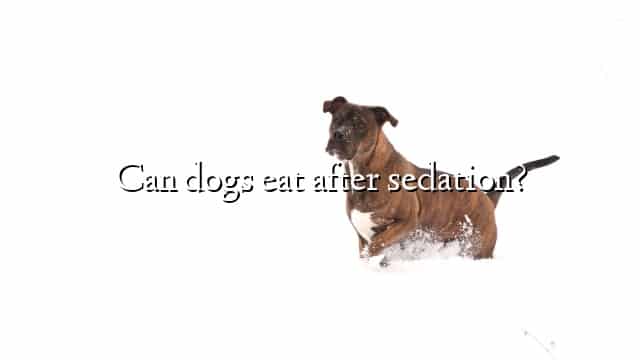Dogs cannot eat after sedation. Sedation will affect their ability to digest food and may even lead to vomiting.
How long does it take for sedation to wear off in dogs?
Sedation usually wears off in about an hour or so in dogs. However, some breeds of dog may take longer to recover from anesthesia.
How do I care for my dog after sedation?
After sedation, your dog will need to be monitored for any signs of complications. These can include changes in behavior or energy levels, as well as increased thirst or urination. If you notice any of these signs, please contact your veterinarian immediately.
How long after Anaesthetic can dogs eat?
Dogs should not eat for at least two hours after receiving general anaesthesia.
Why do dogs cry after anesthesia?
Dogs cry after anesthesia because they are experiencing a range of emotions including fear, sadness, and relief.
What are the side effects of sedation?
Sedation can have a number of side effects, depending on the medication and dosage. These can include drowsiness, dizziness, blurred vision, difficulty breathing, and amnesia. Some side effects are more common than others, and may go away after a while. Talk to your doctor about any concerns you have before taking sedatives.
Can dogs drink water before sedation?
Dogs can drink water before sedation, but it’s not necessary and may cause some complications. When a dog is given anesthesia, the anesthetic gas (anesthetic) blocks the absorption of fluids, including water. If a dog drinks water before anesthesia, the anesthetic gas will also block the absorption of water and potentially increase the risk of dehydration or hypovolemia (low blood volume).
Is it normal for dogs to pee themselves after sedation?
There is no one answer to this question as it can depend on a variety of factors, including the particular dog, the sedation method used, and the dosage of sedation administered. Some dogs may pee themselves after sedation while others may not even experience any signs or symptoms. It is important to speak with your veterinarian to get an accurate diagnosis and to determine the best course of action for your dog.
Is sedation bad for dogs?
Sedation is generally safe and effective for dogs, but it does have some potential drawbacks. Sedation can make a dog sleepy and may make it difficult for the dog to communicate or react to danger. It’s always important to use caution when administering sedatives, and never give them to a dog without first consulting a veterinarian.
What should I feed my dog after sedation?
There is no one-size-fits-all answer to this question, as the best diet for a dog after sedation will vary depending on the individual dog’s weight, age, and health. However, some general tips that may be helpful include providing a high-quality diet that is low in fat and carbohydrates, and including plenty of fresh water.
Should I sleep with my dog after surgery?
There is no definitive answer to this question since everyone’s experience with surgery is different. Some people find that sleeping with their dog post-surgery helps to ease anxiety and provide comfort. Others may feel more comfortable leaving their dog home alone while they recover. Ultimately, it is up to the individual to decide what works best for them.
Are dogs sedated to remove stitches?
Dogs are not sedated to remove stitches. A local anesthetic is used to numb the area and the stitches are removed with a pair of forceps.
Can I leave my dog alone after surgery?
The best way to care for your dog after surgery is to keep them confined to their home until they are fully recovered. You can leave them alone for short periods of time, but it is important to monitor them closely and never leave them unattended for long periods of time.
Why does my dog smell after surgery?
After surgery, your dog may smell due to an increase in bacteria. This is because the surgery disrupted the natural bacteria balance in your dog’s intestines, which can lead to an increase in odor. Your veterinarian may prescribe antibiotics to help reduce the odor.
When are dogs too old for surgery?
Dogs are generally considered to be too old for surgery when they are eight to twelve years old. However, there are a few exceptions to this rule, such as when a dog has an emergency surgery that is required right away.
